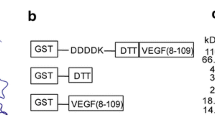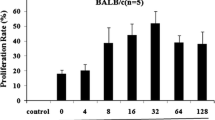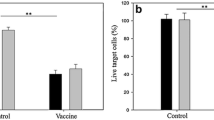Abstract
Since immunity is generally suppressed by immunoregulatory factors, such as transforming growth factor-beta (TGF-β), interleukin (IL)-10, and vascular endothelial growth factor (VEGF), produced by tumor cells or stromal cells surrounding tumor cells, various kinds of cancer immunotherapy mostly fail to elicit potent antitumor immunity. Herein, we tested whether neutralization of TGF-β can elicit strong antitumor immune responses and tumor regression in tumor-bearing mice. A plasmid DNA, pcDNA-sTGFβR/huIg, encoding a fusion protein consisting of the extracellular domain of TGF-β type II receptor (TGFβRII) and the Fc portion of human IgG heavy chain, was injected through different routes into B6 mice carrying established tumors of E.G7 cells, which consist of the poorly immunogenic tumor cells EL4, transfected with the ovalbumin (OVA) gene. The frequency of OVA-specific cytotoxic T lymphocytes (CTL), in the treated mice. increased resulting in the tumor eradication and relapse-free survival in around 70% of the E.G7-bearing mice. In contrast, administration of mock DNA into E.G7-bearing mice did not elicit tumor-specific immune responses. Therefore, administration of DNA encoding TGFβRII allowed tumor-bearing hosts to elicit sufficiently potent antitumor immune responses without requirement of further active antigen-immunization. This strategy seems to be applicable to clinical therapy against cancer, because it is low-cost, safe, and easy to manipulate.





Similar content being viewed by others
References
Almand B, Resser JR, Lindman B, Nadaf S, Clark JI, Kwon ED, Carbone DP, Gabrilovich DI (2000) Clinical significance of defective dendritic cell differentiation in cancer. Clin Cancer Res 6:1755–1766
Chouaib S, Asselin-Paturel C, Mami-Chouaib F, Caignard A, Blay JY (1997) The host-tumor immune conflict: from immunosuppression to resistance and destruction. Immunol Today 18:493–497
Fargeas C, Wu CY, Nakajima T, Cox D, Nutman T, Delespesse G (1992) Differential effect of transforming growth factor beta on the synthesis of Th1-like and Th2-like lymphokines by human T lymphocytes. Eur J Immunol 22:2173–2176
Gabrilovich DI, Corak J, Ciernik IF, Kavanaugh D, Carbone DP (1997) Decreased antigen presentation by dendritic cells in patients with breast cancer. Clin Cancer Res 3:483–490
Ghosh AK, Moore M (1992) Tumour-infiltrating lymphocytes in cervical carcinoma. Eur J Cancer 28:1910–1916
Gorelik L, Flavell RA (2001) Immune-mediated eradication of tumors through the blockade of transforming growth factor-beta signaling in T cells. Nat Med 7:1118–1122
Hilders CG, Ras L, van Eendenburg JD, Nooyen Y, Fleuren GJ (1994) Isolation and characterization of tumor-infiltrating lymphocytes from cervical carcinoma. Int J Cancer 57:805–813
Kiertscher SM, Steven JL, Dubinett M, Roth MD (2000) Tumors promote altered maturation and early apoptosis of monocyte-derived dendritic cells. J Immunol 164:1269–1276
Kobie JJ, Wu RS, Kurt RA, Lou S, Adelman MK, Whitesell LJ, Ramanathapuram LV, Arteaga CL, Akporiaye ET (2003) Transforming growth factor β inhibits the antigen-presenting functions and antitumor activity of dendritic cell vaccines. Cancer Res 63:1860–1864
Mehrotra S, Stevens R, Zengou R, Chakraborty NG, Butterfield LH, Economou JS, Dorsky DI, Mukherji B (2003) Regulation of melanoma epitope-specific cytolytic T lymphocyte response by immature and activated dendritic cells, in vitro. Cancer Res 63:5607–5614
Merogi AJ, Marrogi AJ, Ramesh R, Robinson WR, Fermin CD, Freeman SM (1997) Tumor-host interaction: analysis of cytokines, growth factors, and tumor-infiltrating lymphocytes in ovarian carcinoma. Hum Pathol 28:321–331
Murakami M, Takahashi Y, Isashi Y, Kon S, Jia WY, Inobe M, Abe R, Uede T (1996) Identification and characterization of an alternative cytotoxic T lymphocyte-associated protein 4 binding molecule on B cells. Proc Natl Acad Sci USA 93:7838–7842
Ohm JE, Carbone DP (2001) VEGF as a mediator of tumor-associate immunodeficiency. Immunol Res 23:263–272
Palladino MA, Morris RE, Starnes HF, Levinson AD (1990) The transforming growth factor-betas. A new family of immunoregulatory molecules. Ann NY Acad Sci 593:181–189
Pardoll D, Allison J (2004) Cancer immunotherapy: breaking the barriers to harvest the crop. Nat Med 10:887–892
Roberts AB, Sporn MB, Assoian RK, Smith JM, Roche NS, Wakefield LM, Heine UI, Liotta LA, Falanga V, Kehrl JH, Fauci AS (1986) Transforming growth factor type beta: rapid induction of fibrosis and angiogenesis in vivo and stimulation of collagen formation in vitro. Proc Natl Acad Sci USA 83:4167–4171
Sheu BC, Lin RH, Lien HC, Ho HN, Hsu SM, Huang SC (2001) Predominant Th2/Tc2 polarity of tumor-infiltrating lymphocytes in human cervical cancer. J Immunol 167:2972–2978
Steinbrink K, Graulich E, Kubsch S, Knop J, Enk AH (2002) CD4(+) and CD8(+) anergic T cells induced by interleukin-10-treated human dendritic cells display antigen-specific suppressor activity. Blood 99:2468–2476
Won J, Kim H, Park EJ, Hong Y, Kim SJ, Yun T (1999) Tumorigenicity of mouse thymoma is suppressed by soluble type II transforming growth factor ß receptor therapy. Cancer Res 59:1273–1277
Yang AS, Lattime EC (2003) Tumor-induced interleukin 10 suppresses the ability of splenic dendritic cells to stimulate CD4 and CD8 T-cell responses. Cancer Res 63:2150–2157
Acknowledgments
This work was founded in part by Grant-in-aid for scientific research from the Ministry of Education, Science, Sports and Culture, Japan (Nos. 10671249, 13671380, 14571262, and 15591340).
Author information
Authors and Affiliations
Corresponding author
Rights and permissions
About this article
Cite this article
Kontani, K., Kajino, K., Huangi, CL. et al. Spontaneous elicitation of potent antitumor immunity and eradication of established tumors by administration of DNA encoding soluble transforming growth factor-β II receptor without active antigen-sensitization. Cancer Immunol Immunother 55, 579–587 (2006). https://doi.org/10.1007/s00262-005-0044-3
Received:
Accepted:
Published:
Issue Date:
DOI: https://doi.org/10.1007/s00262-005-0044-3




